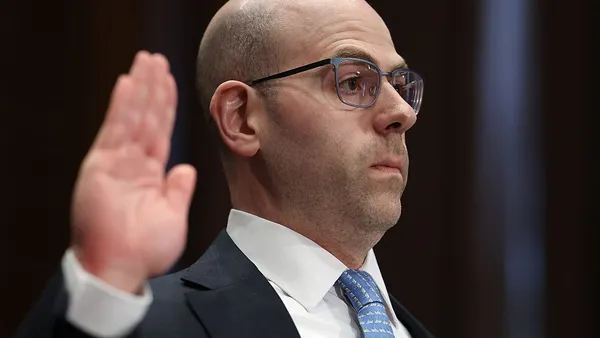Dive Brief:
- A group of investors who collectively manage £1.2 trillion (nearly $1.6 trillion) in assets are asking HSBC to reaffirm its net-zero emissions goals and commitment to the clean energy transition.
- The 30 investors, spearheaded by responsible investment NGO ShareAction, called on the bank to “urgently affirm it will continue to build on its existing climate progress rather than backtrack, and to undertake this process in dialogue with shareholders” in a statement shared during HSBC’s annual meeting Friday.
- The letter’s signatories include Axiom Alternative Investments, Church of England Pensions Board, Ethos Foundation, Greater Manchester Pension Fund, Rathbones Investment Management and Trinity College Cambridge, among others.
Dive Insight:
The British bank appointed Julian Wentzel — who has worked at HSBC for almost a decade — as its new chief sustainability officer in February. HSBC CFO Pam Kaur said at the time that “supporting the transition to net zero remains a priority for HSBC and for the customers we serve” in an internal memo seen by ESG Dive.
Wentzel was named permanent CSO after serving in the interim role for more than a month. He assumed the role after his predecessor, Celine Herweijer, stepped down at the end of 2024 following a corporate reshuffle that downsized the bank’s executive committee. The reshuffle ultimately eliminated the role of CSO from that committee.
Shortly after confirming Wentzel as its new sustainability chief, HSBC unveiled plans to push back its net-zero emissions target date from 2030 to 2050 in its annual report released Feb. 19. HSBC — the largest bank in Europe by market capitalization, assets and revenue — said in the report it had “revisited [its] ambition,” leading to the 20-year adjustment to its goal of hitting net-zero in its operations, business travel and supply chain.
“After dropping its Chief Sustainability Officer from its executive committee and announcing plans to review its climate targets and policies in February, HSBC has sent deeply concerning signals around whether managing the rapidly multiplying financial risks of global heating is still one of its priorities,” Jeanne Martin, ShareAction’s banking program head, said in a Friday release.
Martin said despite showing climate leadership in the past, HSBC’s recent moves have “left [responsible investors] in the dark on just how committed the bank remains to playing its significant part in securing the long-term prosperity of our global economy.”
HSBC’s decision to delay its net-zero emissions target for its own operations from 2030 to 2050 put it in line with decarbonization strategies in place at rival banks, including Barclays, JPMorgan Chase and Bank of America.












